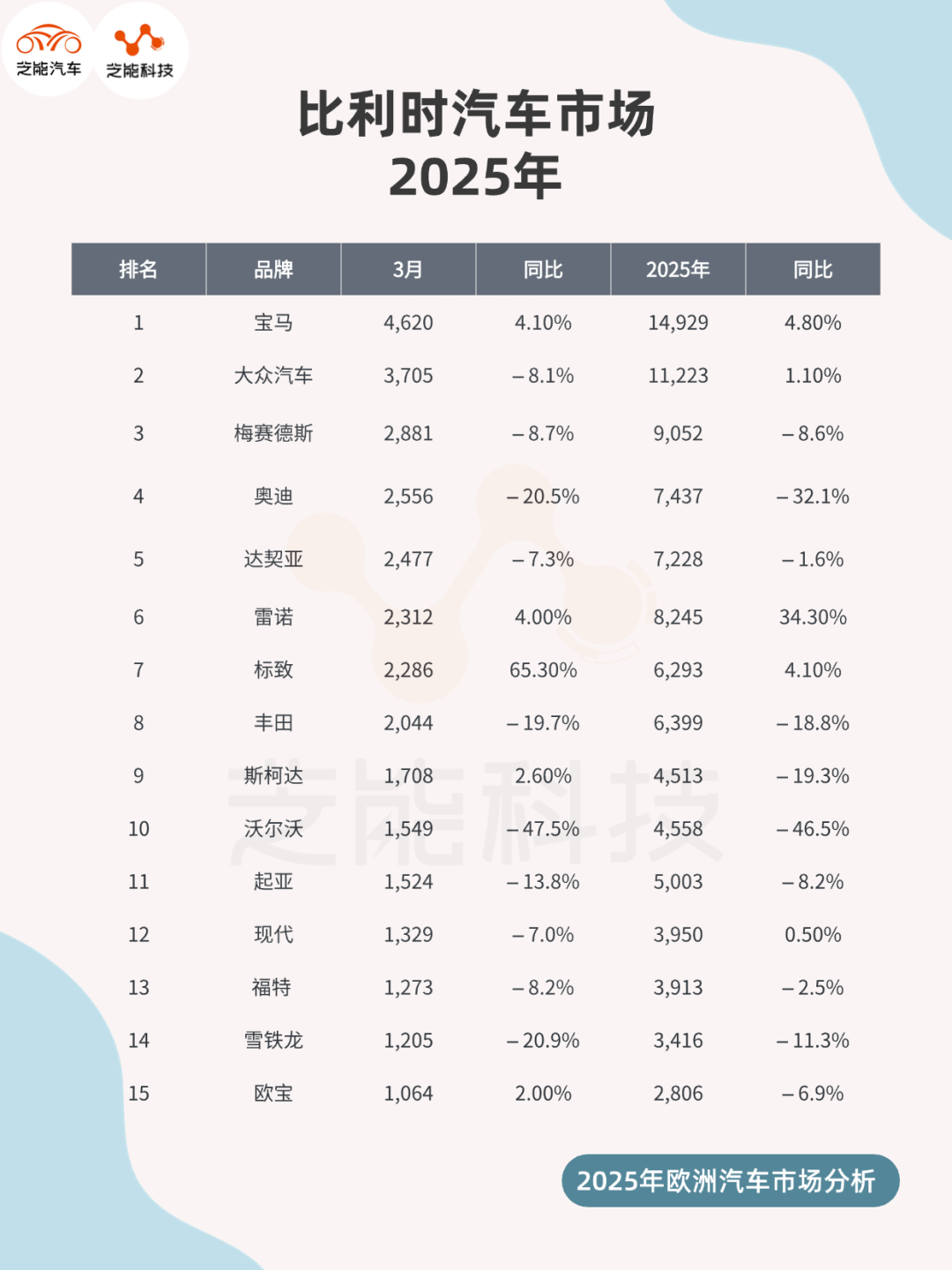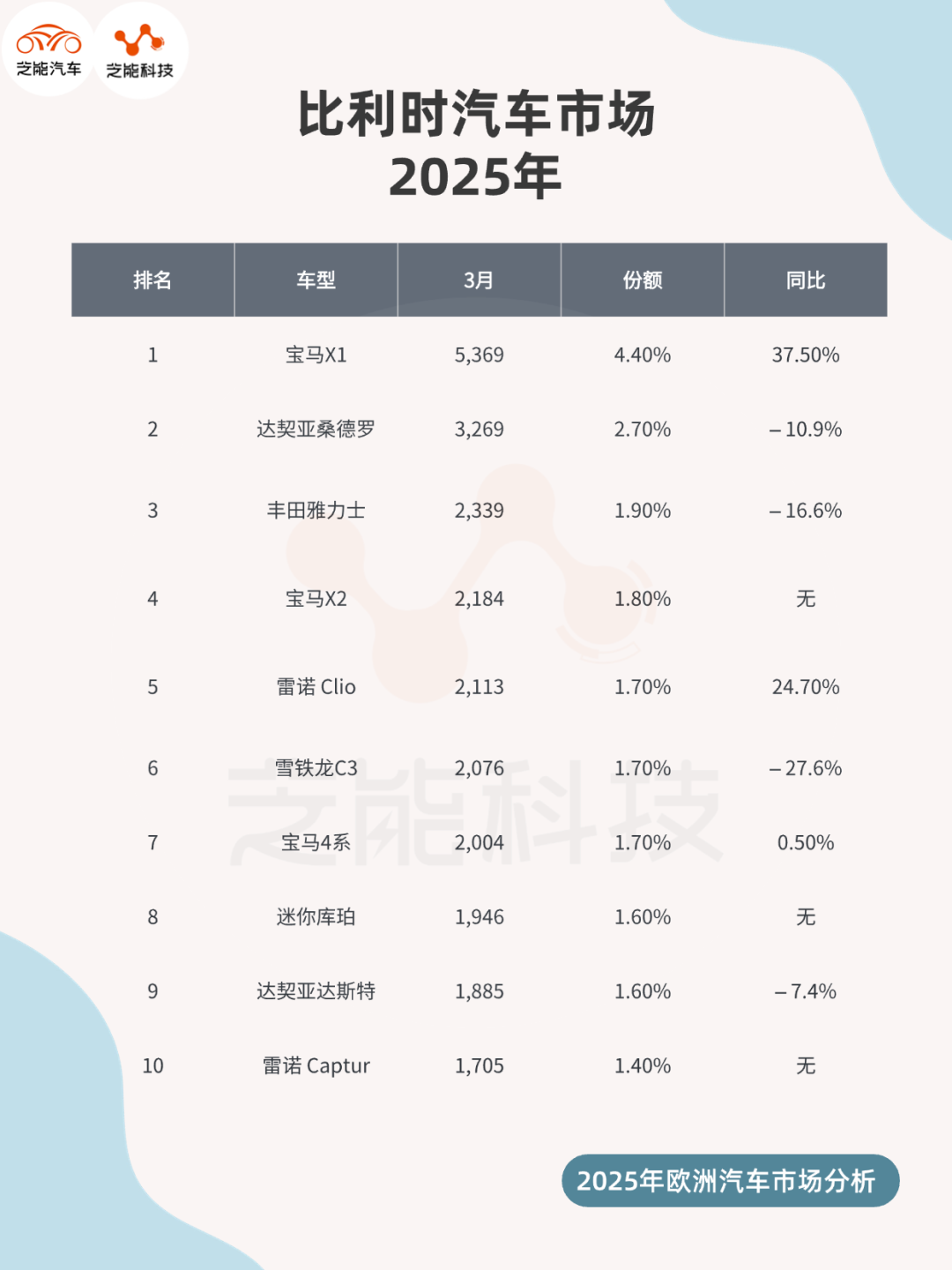European Auto Market | Belgium, March 2025: Tesla's Steep Decline Amid Peugeot's Robust Recovery
![]() 04/23 2025
04/23 2025
![]() 545
545

In March 2025, Belgium's new car sales dropped by 10.2% YoY to 40,184 units, with cumulative sales for the first quarter down 10.5% to 120,939 units.
Electric vehicle (BEV) market share surged to 33.4%, while gasoline-powered cars maintained their dominance at 42.1%.
Peugeot recorded a remarkable 65.3% growth, BMW retained its top position, and Tesla's sales plummeted by 69.3%. Chinese brands BYD and Xpeng delivered exceptional performances.
01
Belgium, March 2025
Sales Overview & Brand Performance
According to the latest figures, new car sales in Belgium fell by 10.2% YoY to 40,184 units in March, with cumulative sales for the first quarter reaching 120,939 units, down 10.5% YoY. The decline is likely attributed to economic slowdown, weak consumer confidence, and high vehicle prices.
● In terms of powertrains:
◎ Gasoline cars retained their dominance with a market share of 42.1%, experiencing a slight increase of 0.3% YoY.
◎ Electric vehicles (BEV) saw a 4.9% growth, accounting for 33.4% of the market share, reflecting the government's push towards electrification and the expansion of charging infrastructure.
◎ Hybrid electric vehicles (HEV) rose by 3.4%, holding 12.6% of the market.
◎ Plug-in hybrid electric vehicles (PHEV) declined by 7.1%, accounting for just 7.8%.
◎ Diesel cars continued their decline, shrinking to 3.3% of the market.
● Among private buyers, 62.9% opted for gasoline cars, whereas 54.2% of commercial customers preferred electric vehicles, signaling the growing trend towards electrification in corporate fleets.

● Brand Sales Rankings & Performance
◎ BMW: Sold 4,620 units, capturing 11.5% of the market, up 4.1% YoY, maintaining its top position. Its electric models iX1, i4, and iX2 performed robustly, contributing to the brand's growth despite market headwinds.
◎ Volkswagen: Sold 3,705 units, holding 9.2% of the market, down 8.1% YoY, ranking second. Its electric models like the ID.4 performed well, but overall sales were impacted by the market downturn.
◎ Mercedes-Benz: Sold 2,881 units, accounting for 7.2% of the market, down 8.7% YoY, ranking third. Electric models such as the EQB and EQA entered the top 20, supporting the brand's performance.
◎ Audi: Sold 2,556 units, capturing 6.4% of the market, down 20.5% YoY, ranking fourth. New models like the Q6 performed well, but overall sales faced pressure.
◎ Dacia: Sold 2,477 units, holding 6.2% of the market, down 7.3% YoY, ranking fifth. The Sandero and Duster maintained steady demand due to their cost-effectiveness.
◎ Peugeot: Sold 2,286 units, capturing 5.7% of the market, up 65.3% YoY, ranking seventh. Strong sales of electric models like the e-208 and 308 drove growth.
◎ Tesla: Sold 958 units, capturing 2.4% of the market, down a staggering 69.3% YoY, ranking sixteenth. The Model Y and Model 3 experienced significant declines due to brand image issues and the transition to new models.
● Chinese Brand Sales Performance
Chinese brands demonstrated robust growth in the Belgian market.
◎ BYD sold 340 units, capturing 0.8% of the market, up 128.2% YoY, ranking 25th. Its electric models such as the Song PLUS and Atto 3 were popular due to their price advantage and smart features.
◎ Xpeng sold 119 units, capturing 0.3% of the market, delivering impressive performance as a new entrant with astonishing YoY growth, ranking 32nd. Models like the G9 and P7 attracted consumers with their high cost-performance.
◎ Brands like Zero Run (43 units, 0.1%), Ora (40 units, 0.1%), and Dongfeng (3 units, 0.0%) recorded lower sales volumes. In 2024, Chinese brands accounted for a significant share of electric vehicle sales in Belgium, and this share is expected to further increase in 2025.
02
Model Sales & Competitive Landscape Analysis

● Based on first-quarter data, the Belgian auto market:
◎ The BMW X1 led sales with 5,369 units, up 37.5% YoY, with its electric version, the iX1, being the best-selling model in March.
◎ Dacia Sandero (3,269 units, -10.9%) and Toyota Yaris (2,339 units, -16.6%) ranked second and third, respectively, with gasoline and hybrid versions as their main offerings.
◎ BMW X2 (2,184 units) and Renault Clio (2,113 units, +24.7%) entered the top five, showcasing the appeal of electric and hybrid models.
◎ Citroen C3 (2,076 units, -27.6%), BMW 4 Series (2,004 units, +0.5%), Mini Cooper (1,946 units), Dacia Duster (1,885 units, -7.4%), and Renault Captur (1,705 units) completed the top ten.
◎ Among electric models, Volkswagen ID.4 (13th), Mercedes-Benz EQB (15th), Audi Q6 (16th), and Mercedes-Benz EQA (20th) stood out, while Tesla Model Y (-66.5%) fell to 13th, reflecting weakened market competitiveness.
● The competitive landscape in the Belgian auto market is characterized by a trend of differentiation driven by electrification.
◎ BMW firmly holds the premium market with its electric lineup of iX1, i4, and iX2, especially dominating the top positions in Flanders.
◎ Peugeot achieved a 65.3% growth through the electrification of the e-208 and 308, demonstrating the rebound potential of local brands in the small and medium car market.
◎ Dacia and Renault consolidated their positions in the low-to-mid-end market with cost-effective gasoline and hybrid models, performing particularly well in Wallonia.
◎ Tesla's 69.3% sales decline is concerning, with the Model Y and Model 3 slipping to 13th and 38th positions, respectively. Brand image issues, production adjustments during the Model Y's transition to new models, and low-price competition from Chinese brands like BYD and Xpeng have all impacted Tesla.
◎ Chinese brands are emerging as new forces in the electric vehicle market. BYD and Xpeng are swiftly capturing Tesla's market share with their price advantages and rapidly evolving smart technologies.
◎ Traditional brands such as Volkswagen, Mercedes-Benz, and Audi have increased their investments in the electric vehicle segment, with the improved rankings of models like the ID.4, EQB, and Q6 reflecting their transformation efforts.
◎ However, brands like Volvo (-47.5%) and Toyota (-19.7%) are facing pressure due to their slower pace of electrification.
The electric vehicle market is expected to continue growing, with market share potentially surpassing 40%. Chinese brands are anticipated to further compress the space of traditional brands with their cost advantages and product diversity.
Summary
In March 2025, Belgium's auto market experienced a 10.2% sales decline amid economic pressures, but the electric vehicle market share rose to 33.4%, signaling the unstoppable trend towards electrification.
BMW and Peugeot led the market with high-end electric vehicles and localization strategies, respectively, while Tesla's 69.3% plunge exposed its branding and supply chain challenges. Chinese brands BYD and Xpeng emerged with 128.2% and explosive growth, becoming significant players in the electric vehicle market.







